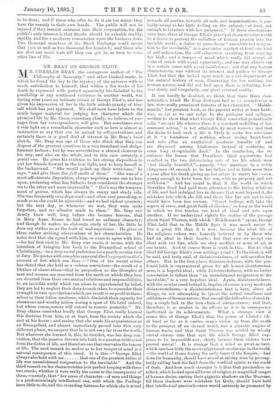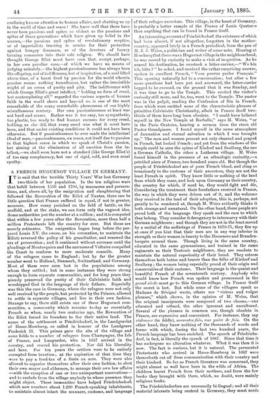MR. BRAY ON GEORGE ELIOT.
Air. CHARLES BRAY, the courageous author of The Philosophy of Necessity," and other kindred works, in which he found the key to the mystery of the universe with so much satisfaction to himself, that within a few weeks of his death he expressed with perfect equanimity his disbelief in the possibility of any continued existence in another world, was during nine years an intimate friend of George Eliot's, and has given his impression of her in the little autobiography of himself which has just appeared. We shall soon have before us the much larger material for judging her character which the promised life by Mr. Cross. consisting chiefly, we believe, of passages from her correspondence, will give. But sometimes even a side light on a remarkable character such as hers is almost as instructive as any that can be gained by self-portraiture, and certainly there is a good deal of interest in Mr. Bray's brief sketch. Mr. Bray was one of those who think that they can dispose of the greatest questions in a very trenchant and sledgehammer fashion ; but he was nevertheless a shrewd observer in his way, and also on the whole, and in this case certainly, a genial one. He gives his evidence to her strong disposition to put her friends forward in the best light, and to keep herself in the background. " She would polish up their witticisms," he says, " and give them the full credit of them." " She was of a most affectionate disposition, always requiring some one to lean upon, preferring what has hitherto been considered the stronger sex to the other and mere impressible." "Her's was the temperament of genius, which has always its sunny and shady side. She was frequently very depressed—and often very provoking, as much so as she could be agreeable—and we had violent quarrels ; but the next day, or whenever we met, they were quite forgotten, and no allusion made to them." Mr. Bray evidently knew well, long before she became famous, that in Mary Anne Evans he had found no ordinary character; and though he makes no elaborate study of her, the little he does say strikes us as the fruit of real experience. He gives us three rather striking observations of her characteristics. He notes first that she agreed with him, or came to agree with him, —for her first visit to Mr. Bray was made, it seems, with the intention of bringing him back to the Evangelical school of Christianity,—in a deep moral preference for a purely secular view of duty. He quotes with complete approval the Con gregationalist's account of her, which ran thus :—" One of her recent critics has stated that she held as a solemn conviction—the result of a lifetime of observation—that in proportion as the thoughts of men and women are removed from the earth on which they live, are diverted from their own mutual relations and responsibilities, to an invisible world which can alone be apprehended.by belief, they are led to neglect their duty to each other, to squander their strength in vain speculations which can result in no profit to themselves or their fellow creatures, which diminish their capacity for strenuous and worthy action during a span of life brief indeed, but whose consequences will extend to remote posterity." Mr. Bray claims somewhat loudly that George Eliot really learned this doctrine from him, or, at least, from the society which she met at his house ; and seeing that she made his acquaintance as an Evangelical, and almost immediately passed into this very different phase, we suspect that he is not very far from the truth. But wherever she learned it, this, he testifies, was her deep conviction, that the passion thrown into faith is a passion subtracted from the duties of life, and therefore one that enervates the tenonr of life. The next remark he makes as to her temper of mind is a natural consequence of this creed. It is this—" George Eliot
always also held with me that one of the greatest duties of life was nnembittered resignation to the inevitable." And the third remark on her characteristics is in perfect keeping svith these two creeds, whether it were really the cause or the consequence of them,—namely, that " her sense of character—of men and things is a predominatingly intellectual one, with which the Feelings have little to do, and the exceeding fairness for which she is noted towards all parties, towards all sects and denominations, is probably owing to her little feeling on the subject,—at least, not enough to interfere with her judgment." If these observations were true, three of George Eliot's principal characteristics would be a desire to prevent the radiation of human passion into the invisible world ; a desire to press home " unembittered resignation to the inevitable," as a guarantee against at least one kind of self-exhaustion, the self-exhaustion resulting from aspiring too high ; and a temper of mind which really did accept all sorts of creeds with equal equanimity, and one may almost say in a certain sense with equal indifference ; not that any human characteristic was without its interest and pathos to George Eliot, but that she looked upon creeds as a sub-department of the natural history of man, illustrating for her nothing but human nature, and did not look upon them as reflecting, however dimly and irregularly, any great external reality.
It can hardly be doubted, we think, that these three characteristics, which Mr. Bray distinguished as so conspicuous in her, were really prominent features of her character. " Middlemarch," her greatest book, as the present writer at least holds, was, so far as we can judge by the prologue and epilogue, written to show that what George Eliot somewhat pedantically calls "an epic life wherein there is a constant unfolding of farresonant action," is not attainable by most women ; and that the desire to lead such a life is likely to make her who aims at it "a fonndress of nothing, whose loving heart-boats and sobs after an unattained goodness tremble off and are dispersed among hindrances instead of centering in some long recognisable deed." In the conclusion, she reenforces the lesson that Dorothea's ideal aspirations had resulted in the two determining acts of her life which were " not ideally beautiful,"—namely, " her marriage to a sickly clergyman old enough to be her father, and in little more than a year after his death giving up her estate to marry his cousin, young enough to have been his son, with no property and not well-born." And her moral is, that if the world in which Dorothea lived had paid more attention to the fitting relations of life, and had indulged less in dreams that went beyond it, the mistakes into which she fell, and those like her are apt to fall, would have been less serious. "Great feelings will take the aspect of error, and great faith of illusion," so long as the world in which we live teaches one kind of ideal and acts upon another. If we understand rightly the motive of the passage about Saint Theresa, with which " Middlemarch " opens, George Eliot held that in the Middle Ages it was much easier to live a great life than it is now, because the ideal life of the religious orders was honestly believed in by those who had an ideal in their hearts ; but that now we accept one ideal with our lips, while we obey another, or none at all, in our hearts. And of course there is truth in this. But to what ideal did George Eliot's own writings point ? To the ideal, it will be said, and truly said, of disinterestedness, of self-sacrifice for others. But in the first place, disinterestedness, with the profound faith in supernatural grace for all honest disinterestedness, is a hopeful ideal ; while disinterestedness, with no bettor consolation in failure than " au unembittered resignation to the inevitable," is a very hopeless ideal. Again, disinterestedness, with the secular creed behind it, implies of course a very moderate disinterestedness,—a disinterestedness that is bent, above all things, on not attempting to ignore the actual smallness and selfishness of human nature; that sees all the difficulties of modifying a single link in the iron chain of circumstance ; and that, therefore, is as modest in its efforts as it is in consequence ineffectual in its achievements. What a strange view it seems this of George Eliot's that the power of Christ's life, at least so far as it carries man's vision up from the earth to the prospect of an eternal world, was a gigantic engine of human waste, and that Saint Theresa was misled by wholly unreal visions into that epic life which George Eliot supposes to be impossible now, chiefly because these visions have proved unreal l It is strange that a mind as great as hers, which saw how little the most enlightened secular age in the world, —the world of Rome during the early times of the Empire,—had done for humanity, should have aimed at raising man by peremptorily calling back his faith from the world of spirits to the world of flesh. And how much stranger is it that that passionless intellect, which looked upon all forms of religion as magnified images of human desire, casting their gigantic shadows on the Heavens, till those shadows were mistaken for Gods, should have held that intellectual passionlessness would seriously be promoted by confining human attention to human affairs, and shutting us up in the world of time and sense ! She knew well that there have never been passions and spites so violent as the passions and spites of those generations which have given up belief in the unseen,—the passions and spites of revolutionary sceptics, or of imperialists trusting in armies for their protection against hungry dreamers, or of the devotees of luxury turning commerce into their sole religion. We should have thought George Eliot must have seen that, except, perhaps, in her own peculiar case,—of which we have no means of judging minutely,—the highest passionlessness has always been the offspring, not of indifference, but of inspiration, of a soul lifted above time, of a heart fired by passion for the world wherein passion means nothing tumultuous, but rather the irresistible might of an ocean of purity and pity. The indifference with which George Eliot's great intellect, holding no form of creed, but contemplating all," regarded the various aspects of human faith in the world above and beyond us, is one of the most remarkable of the many remarkable phenomena of our highly miscellaneous century. Her own passionlessness at least was not hard and severe. Rather was it too easy, too sympathetic, too plastic, too ready to find human excuses for every creed, holding, as she did, that every creed was what it must have been, and that under existing conditions it could not have been otherwise. But if passionlessness be ever made the intellectual ideal of man,—passionlessness, we mean, not itself due to passion in that highest sense in which we speak of Christ's passion, but aiming at the elimination of all emotion from the intellect,—we shall soon have not a standard (like George Eliot's) of too easy complacency, but one of rigid, cold, and even cruel apathy.







































 Previous page
Previous page